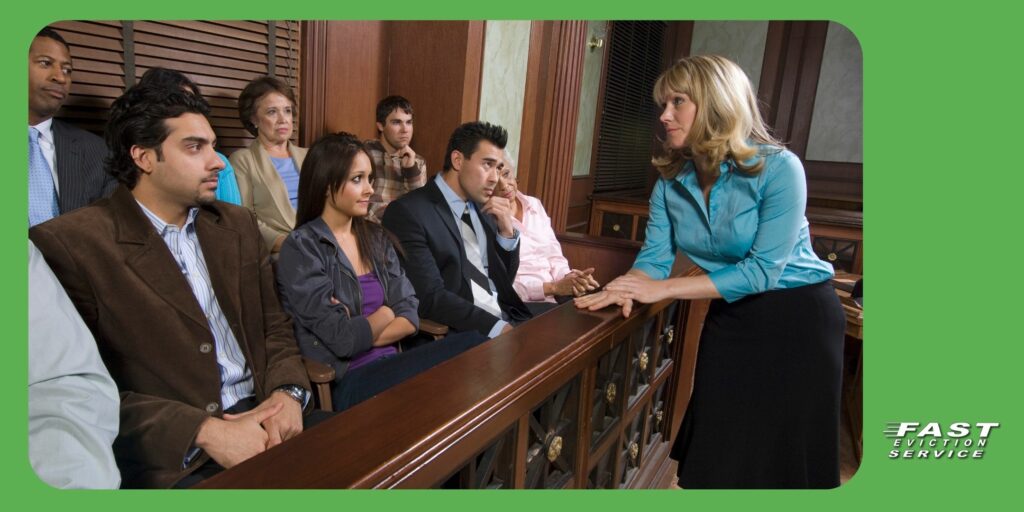Updated 12/26/24
No matter how experienced and well-versed you are as a landlord, the probability of a tenant filing a lawsuit against you cannot be overlooked. Once a lawsuit has been filed in court, both parties are legally obligated to go through the tiresome process of attending hearings or settling the dispute outside of court, often by offering large sums of cash or giving in to the tenant’s demands. Not only does this drain resources, but it also tarnishes your reputation as a property manager.

Fortunately, you can avoid these complications by being proactive, attentive, and diligent in your property management practices. Landlords can prevent lawsuits by adopting excellent practices that foster trust and fairness while mitigating potential risks. This article will explore key strategies to prevent landlord tenant lawsuits and outline the steps to take if faced with one.
Table of Contents
- The Importance of Tenant Screening
- Maintaining Fairness and Respect
- Creating Comprehensive Lease Agreements
- Ensuring Safety and Security of the Rental Property
- Timely Repairs and Maintenance
- Familiarizing Yourself with Housing Laws
- Steps to Take If a Tenant Files a Lawsuit
- Frequently Asked Questions
The Importance of Tenant Screening
Thoroughly screening prospective tenants is one of the most effective ways to avoid landlord tenant lawsuits. By reviewing criminal records, credit history, and rental backgrounds, you can identify tenants who might pose a higher risk of disputes. Screening software is a powerful tool that streamlines this process, alerting you to potential red flags such as a history of legal issues with previous landlords.
For example, if a prospective tenant has been involved in lawsuits against landlords in the past, this could indicate a tendency for litigious behavior. Similarly, reviewing credit reports helps ensure that tenants have the financial stability to meet rental obligations, reducing the likelihood of non-payment disputes.
Maintaining Fairness and Respect
It is essential to treat tenants with fairness and respect. Tenants are not subordinates but individuals who are paying to live in your property. Discriminatory practices, whether intentional or inadvertent, can lead to lawsuits under fair housing laws.
Always communicate clearly and respectfully, and be consistent in your policies. For instance, if you allow one tenant to pay rent late without a penalty, ensure you offer the same courtesy to others under similar circumstances. Fair treatment fosters positive landlord-tenant relationships and minimizes the risk of discrimination claims.
Creating Comprehensive Lease Agreements
A well-drafted lease agreement is your strongest defense against legal disputes. The lease should outline all terms and conditions in detail, including rent, security deposits, maintenance responsibilities, occupancy limits, and rules for pets or long-term guests. Clearly define the process for repairs, entry notices, and lease termination.
Customizing lease agreements to comply with state and local laws ensures they hold up in court. Avoid using generic templates without reviewing them for legal compliance. If necessary, consult an attorney to draft or review your lease agreements.
Ensuring Safety and Security of the Rental Property
Tenants have a legal right to live in a safe and secure environment. Failing to provide such an environment can result in lawsuits for negligence. Before renting out a property, conduct a thorough inspection to identify and address safety issues, such as faulty locks, broken windows, or inadequate lighting.
Consider installing security systems, cameras, or alarm systems for added protection. Regularly assess the property’s safety measures and address tenant concerns promptly. A proactive approach to security reassures tenants and reduces your liability.
Timely Repairs and Maintenance
Ignoring repair requests is a surefire way to invite tenant lawsuits. Landlords are responsible for ensuring that the property remains habitable. Delayed or neglected repairs can lead to injuries or damages, exposing you to liability claims.
Develop a system to promptly address repair requests. Schedule regular property inspections to identify maintenance issues before they become major problems. Hiring licensed professionals to handle repairs ensures the work is done safely and correctly.
Familiarizing Yourself with Housing Laws
Understanding landlord-tenant laws is critical to avoiding legal disputes. These laws vary by state and cover areas such as rent control, eviction procedures, security deposit regulations, and tenant rights. Ignorance of the law is not a valid defense in court.
Stay informed about changes in housing laws by subscribing to updates from local housing authorities or consulting legal experts. For instance, California landlords must provide specific notices before entering a rental property and comply with strict regulations regarding security deposits. Familiarity with these rules ensures you remain compliant and reduces the likelihood of tenant lawsuits.
Steps to Take If a Tenant Files a Lawsuit
Even with the best practices, disputes can arise. If a tenant files a lawsuit, take the following steps to protect your interests:
- Seek Legal Counsel: Consult an attorney experienced in landlord tenant lawsuits. They can guide you through the legal process and represent you in court if necessary.
- Gather Documentation: Collect all relevant documents, including the lease agreement, communication records, repair requests, and inspection reports. These materials are crucial for building your case.
- Attempt Mediation: In many cases, disputes can be resolved through mediation without going to court. Mediation is often faster, less expensive, and less adversarial than litigation.
By acting swiftly and strategically, you can minimize the impact of a tenant lawsuit and protect your reputation as a landlord.
Frequently Asked Questions
1. What are common reasons for tenant lawsuits against landlords?
Tenant lawsuits often arise from issues such as unsafe living conditions, failure to return security deposits, discrimination, or breach of lease agreements. Maintaining open communication and addressing concerns promptly can help prevent these disputes.
2. How can landlords protect themselves from discrimination claims?
Adhering to fair housing laws and treating all applicants and tenants equally is key. Avoid questions about race, religion, or family status during tenant screening, and apply the same policies and standards to everyone.
3. What should landlords include in a lease agreement to prevent lawsuits?
Lease agreements should clearly define terms such as rent payment, security deposits, maintenance responsibilities, and rules for property use. Customizing agreements to comply with local laws and consulting an attorney for review can provide additional protection.
By adopting these proactive measures, landlords can significantly reduce the risk of tenant lawsuits while fostering positive relationships with tenants. Staying informed, attentive, and fair ensures a smooth rental experience for both parties.




